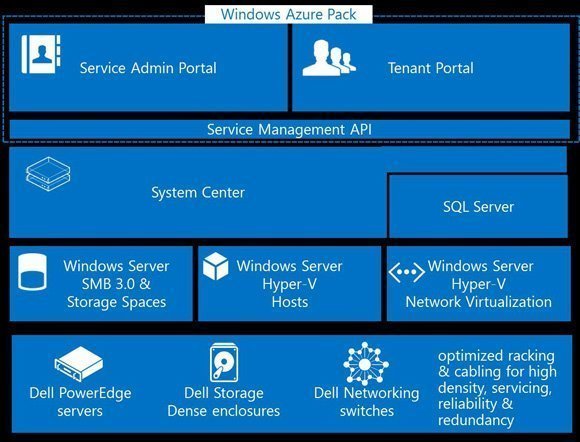One year ago Microsoft announced the Microsoft Cloud Platform System (CPS), also know as a Microsoft’s cloud in a box. CPS introduces a validated, ready-to-run, optimized solution that features Microsoft software stack of Windows Server 2012 R2, System Center 2012 R2, and Windows Azure Pack strategically coupled with Dell PowerEdge servers, Dell Storage and Dell Networking in an integrated, cost-effective appliance.
Also CPS prove an Azure-consistent cloud experience, because has been architected for agility and resiliency based on the experience gained from Azure. CPS offers consistent public, private, and hybrid cloud experiences for maximum flexibility.

First release was CPS Premium, designed provide resiliency, self-service, workload automation, zero-downtime patching, integrated monitoring, integration with Microsoft Azure services. Each rack provides 32 compute nodes and up to 282 TB of usable storage.
Some weeks ago as been announced the CPS Standard, that allows more flexibility in hardware configuration options based on your needs. CPS Standard starts at a minimum of four nodes and expands in units of a single server node up to 16 nodes. You can choose to order different CPUs, different memory configurations, and customized storage configurations (for example, changing the SSD to HDD ratio). Microsoft has reduced the footprint of the management software stack by co-locating management roles, calculating anticipated scale and relying on host clustering as a means of providing high availability. An interesting additional benefit is a much faster initial deployment and configuration of the solution. In our testing, we regularly see the system ready to operate in under three hours.
Also if CPS has been scaled down to run on fewer servers, it still maintain simplicity of deployment and operations. The architectural blueprint for the family remains consistent: CPS Standard combines Microsoft’s proven software stack of Windows Azure Pack, Windows Server 2012 R2, and System Center 2012 R2, with Dell’s server and storage hardware, and is ready to run Microsoft Azure Stack when it is available next year. Hardware and software are validated in collaboration with Dell, and arrive at your door ready to be plugged in and turned on.
This means that the administration experience for CPS Standard is consistent with CPS Premium. Windows Azure Pack provides the Azure-consistent self-service portal, so that the management interface and the skills needed to run CPS solutions of all sizes are the same, making it simple for you to adopt CPS and scale it as your needs grow.
Another key aspect of operations, patching and updating, has been simplified with an automated patch and update framework that deploys pre-validated patches to significantly lower the risk associated with this task.
For sure is an interesting commitment and a strong partnership between Dell and Microsoft. Will be interesting see if something will change in the future due to EMC (and VMware) acquisition.
For more information, see also:













